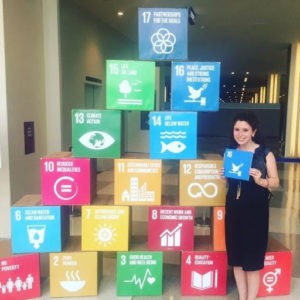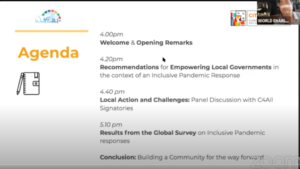Digital Accessibility at HLPF
 Over the course of the past two weeks, the United Nations hosted various sessions and events to discuss sustainable development through the prisms of poverty, partnerships, accessibility, and urban design at its annual High-Level Political Forum (HLPF). In light of the global pandemic, the HLPF was converted to a fully virtual format, which provided unprecedented opportunities for civil society members from all over the world to actively engage in the conversation from the comfort of their own home.
Over the course of the past two weeks, the United Nations hosted various sessions and events to discuss sustainable development through the prisms of poverty, partnerships, accessibility, and urban design at its annual High-Level Political Forum (HLPF). In light of the global pandemic, the HLPF was converted to a fully virtual format, which provided unprecedented opportunities for civil society members from all over the world to actively engage in the conversation from the comfort of their own home.
As an HLPF delegate for UNA-USA, I was extended the opportunity to attend many of these events to engage in the conversation as a youth leader. Acknowledging the virtual format, I was incredibly excited for the chance to attend these incredibly important events—which were taking place in all timezones—from the comfort of my own home with no inconvenience to my employer.

Cities4All Webinar Agenda
As a disabled disability-rights advocate, I was excited to attend Cities4All’s Webinar: Equity and Accessibility in Times of Pandemic: Building “Cities For All”. Acknowledging that persons with disabilities represent the world’s largest minority population, it was great to see an impressive number of side-events, like this one, that were uniquely dedicated to discussing accessibility and inclusion. Recognizing the ways that disability issues relate to many of the SDGs—including poverty (SDG1), health (SDG3), education (SDG4), and reduced inequalities (SDG10), it was great to hear about the UN’s commitment to incorporating and elevating disabled voices and experiences through initiatives, like the Global Survey on Inclusive Pandemic Responses. The speakers, who represented an array of stakeholders from government to NGOs, focused on the importance of promoting partnerships to ensure that people with disabilities have equal access to information by implementing digital accessibility measures.
In addition to being impressed by the caliber of speakers, I was also impressed by the level of discourse in the chatbox. It was great to hear some of my fellow disabled disability-rights activists’ reflections on the HLPF and their recommendations for greater digital accessibility at UN events in the chat, including (but not limited to):
- Standardizing the meeting platform (i.e. Zoom, WebEx, etc) to make it easier for all attendees—particularly persons with disabilities—to register, attend events, and understand the meeting format
- Incorporating a survey into HLPF events to see whether or not attendees require accessibility features (like CART, ASL, etc) and accommodating based on the results to reflect the potential diversity of needs
- Having the moderators reiterate the names and affiliations of the speakers before their remarks to make it easier to follow the programs
- Using closed captions (CART) to make it easier to follow along (especially since there may be issues with microphones) or people may have joined late
It was great to see attendees validating one another’s experiences with the occasional lack of accessibility features, (respectfully) providing general recommendations for improvement, and providing links to more resources and follow-up. I loved that various panelists (including UN staff) acknowledged and responded to some of this feedback—either in the formal discussion or in the chat—and discussed some of their efforts to promote/enhance digital accessibility at future UN events. I really appreciated that, in response to the discourse in the chat, the moderator actually extended the program to provide a safe space for attendees to get more information, co-organize, and join existing (regional-based and global) Cities4All WhatsApp Groups dedicated to these topics. I loved the ways that both the moderator, panelists, and attendees really fostered a communal environment to help us build the world we want.
As we continue to mark the UN’s 75th Anniversary and begin our Decade of Action, it is important to have discussions about the world we want and the UN we need. The COVID-19 pandemic has shifted these conversations to a virtual format, which provides us with unprecedented opportunities to engage with more stakeholders than ever before. I am hoping that, in the years to come, the United Nations continues to incorporate digital accessibility into their formal programming, while also providing/protecting physical civil society spaces to enable large-scale organizing. The HLPF is one of the many ways that we can come together to both honor and evaluate the UN’s 75-year history; and I believe that, if properly utilized, we can use these lessons to build the future we want and the UN we need.



